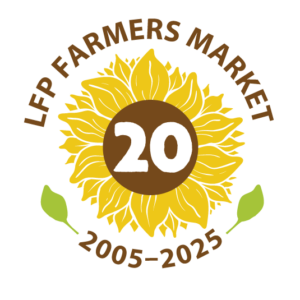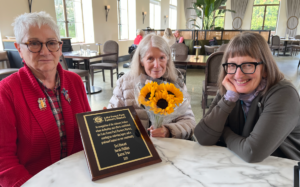 Honoring 20 Years of Community & Fresh Food
Honoring 20 Years of Community & Fresh Food
By Teri Howatt, Sarah Phillips & Karen True
February 2025
In 2000, an innovative partnership between Ron Sher, maverick developer and founder of Third Place Books, and a group of passionate community members led by Anne Stadler brought Third Place Commons to life in Lake Forest Park. The Commons quickly became the “third place” for not only Lake Forest Park residents but those in surrounding towns. Home, Work, Community. Our shared space, welcoming all.
Friends of Third Place Commons (FTPC), a tiny nonprofit organization with fiercely committed board members and an innovative director, managed a calendar of over 1000 free events a year, open to everyone. Third Place Books held author events. The King County Library Service branch in the mall hosted library activities for all ages. School bands and dance studios performed for families and friends. Civic groups held meetings and community outreach events. The space was used by a variety of affinity cohorts, from writers to knitters to teen study groups. Weekly meetups like language conversation groups led by native speakers, hands-on events with visual artists, computer savvy troubleshooters and regular weekend all-ages dances with local bands and musicians, the Commons was a venue for whatever the community wanted or needed from their community center. Schools, social service agencies, local governments, volunteer organizations collaborated. Connections – both likely and unexpected – were made every single day.
A Vision Takes Shape
Five years after the Commons began, board members talked about expanding the reach of the community’s vibrant indoor center by moving some events and activities outside. Northwest summers are brief and glorious, people tend to go and stay outdoors. At the same time, interest was growing in the importance of locally sourced fresh foods. The FTPC board actively explored the possibility of a weekly farmers market. Karen True, FTPC’s director, was invited to attend a symposium on the process of setting up a farmers market, hosted by Project for Public Spaces (PPS) in New York. She knew that if the nonprofit could find funding, a market was possible. With the help of Sarah Phillips and Teri Howatt, Karen applied for a Kellogg Foundation grant specifically designed to fund the setup of a farmers market. FTPC did not win the grant, but PPS insisted the proposal was solid, encouraging them to continue the effort.
A basic planning document was part of the initial grant application, and it was detailed enough to request support from King County Councilmember Carolyn Edmonds. She secured $10,000 to get the project up and running. With this grant in hand, FTPC asked the City of Lake Forest Park for an additional $5,000 to help cover startup costs. Several members of the city council were not in favor of the farmers market, thinking it would benefit Third Place Books. Board members testified that the market would be run by Friends of Third Place Commons, using volunteers and a small managing staff. The only people making money would be the market’s food vendors. Throughout the approval process, Mayor Dave Hutchinson and City Councilmember Roger Olstad were steadfast supporters. After a few tense City Council meetings that included hard-fought changes in city codes to allow parking lot banners and A-frame signs at street entrances, approval was finally granted.
However, the council refused to budge on its refusal to let the market locate in front of City Hall. Several members were opposed to the whole idea, citing its potential to negatively impact Town Center businesses and reluctance to contribute money to an initiative that wasn’t controlled by the city. A farmers market was not a priority, even though many constituents had asked for one.
The market could go forward, but finding a site for the market was difficult. Finally, the company that managed the Lake Forest Park Town Center complex offered the parking lot in front of an office building where most businesses were closed on Sundays. The space was between two banks with ATMs and could accommodate both the market and parking for farmers’ trucks. A win for the market and a win for the farmers. In the first season, merchants in Town Center would report an uptick in traffic and sales on Sundays, a win for businesses, too.
The Right Person for the Job
To open a market during the 2005 season, Friends needed to quickly find an experienced Market Manager. Grant Davidson was suggested. He managed a successful market in Woodinville and served on the board of the WA State Farmers Association (FMA). His wife, Julie, helped found the WIC and Seniors Farmers Market Nutrition Programs providing vouchers to low-income mothers and seniors to buy fresh produce at farmers markets. Grant and Julie’s expertise was invaluable.
Grant set to work immediately but convinced the board to wait to open until June, 2005 on Father’s Day. If we opened too early, he said, we’d have “only a few farmers selling asparagus and plant starts.” The new market needed to open with “eye-popping bounty.” If customers were underwhelmed, it could take months for them to return for another look. Establishing an early base of repeat, loyal customers shopping for a week’s worth of produce was critically important to ensure the continued success of a farmers market. For this reason, he also urged the board to limit arts and crafts to special market days.
A lot goes into running a market that sells food. Making sure the facility passes King County Public Health inspections, maintaining close involvement with the FMA to keep current on changing policies, best practices, and learning about innovative proposals and opportunities. Grant also had to have policies in place to ensure safety and crowd control, collect stall rentals, enforce no-show penalties, deal with dog (and owner) misbehavior, comply with insurance stipulations, etc. Many of these policy decisions directly involved the board.
FTPC and the Davidsons were also determined that the market would be open to all income levels, setting up a system to reimburse vendors who otherwise could not accept EBT payments. Later, FTPC would also initiate Market Bucks, spendable chits distributed by nearby schools, senior centers and other social service agencies to their eligible clients.
Beyond All Expectations
Opening day was a smashing success. At the very beginning of the day an eagle cruised overhead surveying the activity. Grant (a member of a local tribe) called it a good omen. Elected officials, civic organizations, partner agencies, musicians and dancers were on hand for the opening ceremonies and subsequent entertainment. Lake Forest Park Rotary served a hearty breakfast. The crowd, many of whom had been asking the city and Friends of Third Place Commons to make a farmers market happen, was enthusiastic. So enthusiastic that both ATMs ran out of cash before the market closed. It usually takes a farmers market four seasons to earn a profit. Opening day exceeded expectations. The community came, bought flowers and food, and Grant reported that it was the most successful opening day in the region. That success continued, and at the end of the first year, after fees and expenses, the Commons Farmers Market was $0.38 ahead! The Market was on its way to becoming the beloved local institution it is today.
Friends of Third Place Commons had been building strong connections and trust for five years. So by 2005 the community – organizations, schools, businesses, individuals, and more – was ready to embrace the expansion of their community space. This was, and is, the ‘secret sauce’ that has kept both Third Place Commons and the Commons Farmers Market going strong in Lake Forest Park’s Town Center.
Lake Forest Park Market Founders Sarah Phillips, Teri Howatt & Karen True (March 2025)
